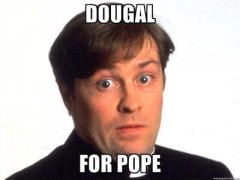Yesterday someone posted a question on Facebook asking Christians what made them lose joy and hope. I thought it was an interesting question, pondered briefly and then replied that, based on how I understand them, I have never lost either. Indeed, I would say that it is actually joy and hope, along with other 'Spiritual fruitiness' that is what remains, and sustains me, in the very dark places that other people were identifying as those which caused them to lose joy or hope. Perhaps, as I hinted in my reply, it is what we mean by 'hope' and 'joy' that informs how it is affected by circumstance.
JOY
It's a pair of stories I have told many times before, here and elsewhere, about knowing what joy is, but they bear a further telling, because they illustrate so well what I mean. Each arose from all age services looking at the 'fruit of the Spirit' one from a child of around five, the other from a woman in her sixties...
Little girl jumping up and down on the spot says "it's when you just can't stop yourself from jumping for joy"
Grandmother who had just buried her (third) infant grandchild in the same week as a young couple in the church had given birth to a healthy baby, "joy means I can be happy for A&B even though my heart is breaking for C&D"
This is joy, not some fluffy emotion, not fleeting happiness, but indefatigable, irrepressible, refusal to be overcome... the light shines in the darkness and the darkness has not overcome it.
HOPE
Again I think there is a need to explain what we mean by hope - and what we don't. The word is used so glibly (and I am as guilty as any) that it applies to anything we wish for... I hope it doesn't rain, I hope to see you next week, I hope the film is good... But that is as far from Christian hope as you can wish for. Another story...
The little Baptist worship book called Patterns and Prayer includes a couple of suggested liturgies for infant blessings. In one of the forms are words to the effect that this is done in the hope that the child will, in due course, come to faith and express that in baptism. Evidently the publishing house queried the word 'hope' seeing it as too wishy-washy, too passive, too lacking in something or other they felt should be there. The writers stood their ground; hope carries with it a sense of expectation, an acceptance of activity, a certain something that, whatever happens the promise will come good.
Whenever I try to define hope, I end up at Hebrews 11 and the great catalogue of 'faithful' people. Hope is, I feel, very like and very allied to, faith. Even though I walk through a valley as dark as death, yet I have hope.
I have a good life, a mostly happy and fulfilling life, but by heck it has had - and will continue to have - some dark places, frightening places, anxious places, lonely places. There are times when I am anything but happy, times when all my dream lie in tatters at my feet, but I do believe that joy and hope survive - and it is the fact that they do, they they are not defined or constrained by circumstance, that means whatever ever happens I can cling on, if only by my finger tips, and keep on keeping on.
Sometimes things seem to happen all at once. A lot of my friends and my church folk are facing enormous challenges and frightening times. For the most part they remain resilient and strong - well on the outside anyway, even though they ache and break inwards. I pray, with all the faith I can muster, that joy and hope, peace and love will be theirs.
As the final verse of the old hymn "I thank three Lord of rlife" puts it:
I thank thee, Lord, for hope:
What yet shall be I may not know;
the unseen days will changes bring,
but through them all hope's star shall glow,
and I shall have my song to sing.
James W Butcher (1857-1937)
